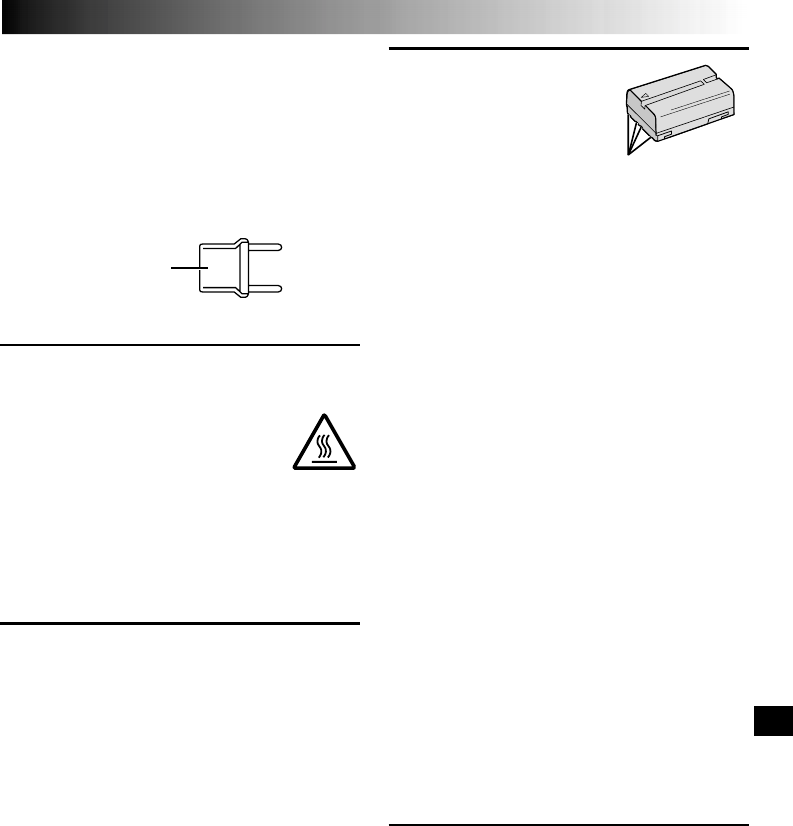
EN85
Video Light
DANGER
Ⅲ The video light can become extremely hot.
Do not touch it either while in operation
or soon after turning it off, otherwise
serious injury may result.
Ⅲ Do not place the camcorder into the carrying case
immediately after using the video light, since it
remains extremely hot for some time.
Ⅲ When operating, keep a distance of about 30 cm (11-
13/16”) between the video light and people or objects.
Ⅲ Do not use near flammable or explosive materials.
Ⅲ It is recommended that you consult your nearest JVC
dealer for replacing the video light.
General Battery Precautions
If the remote control is not functioning even if it is
being operated correctly, the batteries are exhausted.
Replace them with fresh ones.
Use only the following batteries: AAA (R03) size x 2
Please make note of the following rules for battery use.
When misused, the batteries can leak or explode.
1. When replacing batteries, refer to page 56.
2. Do not use any different size of batteries from those
specified.
3. Be sure to install batteries in the correct direction.
4. Do not use rechargeable batteries.
5. Do not expose the batteries to excessive heat as they
can leak or explode.
6. Do not dispose of the batteries in a fire.
7. Remove the batteries from the unit if it is to be stored
for an extended period to avoid battery leakage
which can cause malfunctions.
CAUTIONS
When using the AC Adapter in areas other than the
USA
Ⅲ The provided AC Adapter features automatic voltage
selection in the AC range from 110 V to 240 V.
USING HOUSEHOLD AC PLUG ADAPTER
In case of connecting the unit’s power cord to an AC
wall outlet other than American National Standard C73
series type use an AC plug adapter, called a “Siemens
Plug”, as shown.
For this AC plug adapter, consult your nearest JVC dealer.
Plug adapter
Battery Packs
The supplied battery pack is a
lithium-ion battery. Before using
the supplied battery pack or an
optional battery pack, be sure to
read the following cautions:
1. To avoid hazards . . .
... do not burn.
... do not short-circuit the terminals. When
transporting, make sure the provided battery cap
is attached to the battery. If the battery cap is
misplaced, carry the battery in a plastic bag.
... do not modify or disassemble.
... do not expose the battery to temperatures
exceeding 60°C (140°F), as this may cause the
battery to overheat, explode or catch fire.
... use only specified chargers.
2. To prevent damage and prolong service life . . .
... do not subject to unnecessary shock.
... charge in an environment where temperatures are
within the tolerances shown in the chart below.
This is a chemical reaction type battery—cooler
temperatures impede chemical reaction, while
warmer temperatures can prevent complete
charging.
... store in a cool, dry place. Extended exposure to
high temperatures will increase natural discharge
and shorten service life.
... fully charge and then fully discharge the battery
every 6 months when storing the battery pack
over a long period time.
... remove from charger or powered unit when not in
use, as some machines use current even when
switched off.
NOTES:
●
It is normal for the battery pack to be warm after
charging, or after use.
Temperature Range Specifications
Charging............... 10°C to 35°C (50°F to 95°F)
Operation ............. 0°C to 40°C (32°F to 104°F)
Storage ................. –10°C to 30°C (14°F to 86°F)
●
Recharging time is based on room temperature of 20°C
(68°F).
●
The lower the temperature, the longer recharging takes.
Cassettes
To properly use and store your cassettes, be sure to read
the following cautions:
1. During use . . .
... make sure the cassette bears the Mini DV mark.
... be aware that recording onto prerecorded tapes
automatically erases the previously recorded
video and audio signals.
... make sure the cassette is positioned properly
when inserting.
... do not load and unload the cassette repeatedly
without allowing the tape to run at all. This
slackens the tape and can result in damage.
... do not open the front tape cover. This exposes the
tape to fingerprints and dust.
Terminals


















